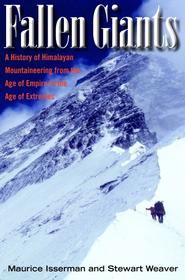
Fallen Giants A History of Himalayan Mountaineering From the Age of Empire to the Age of Extremes, co-authored by Maurice Isserman, the James L. Ferguson Professor of History, and University of Rochester professor Stewart Weaver, received a stream of accolades in a review that appears in the Friday, Sept. 26, edition of the International Herald Tribune and the Sunday, Sept. 28, issue of The New York Times Book Review. "Fallen Giants is the book of a lifetime for its authors, an awe-inspiring work of history and storytelling. They've scoured mountaineering archives in India, Germany, Britain and the United States, and drawn from nearly 500 books and articles, from the famous to the obscure," wrote the reviewer Bruce Barcott, author of The Last Flight of the Scarlet Macaw.
"There's a cumulative reading pleasure in 'Fallen Giants' that comes from watching each 'failed' expedition move a little farther up the high peaks, gather a little more knowledge of local weather patterns, discover one more insight into the human body's response to high altitude," Barcott wrote. The reviewer's last two paragraphs are perhaps the most glowing.
"The authors tease out the evolution of modern mountaineering, combining vivid storytelling with an eye for detail, accuracy and fairness. And of the many lessons to be drawn from their work, perhaps the clearest is this: Himalayan climbing has always been a geo-political game.
"Their endnotes and bibliography run to more than 100 pages. Isserman and Weaver brilliantly present the complete picture - the political context, the changing social dynamics, the emergence of modern climbing technique - without losing sight of the need to entertain. Fallen Giants absolutely brims with vivid characters, from the Duke of the Abruzzi to George Mallory to Aleister Crowley (Mr. 666, a Himalayan climber - who knew?) to Tenzing Norgay to Rein-hold Messner, hard men and egotists, saints and scoundrels. Armchair mountaineers will give the book pride of place in their collections. A word, though: keep it on a low shelf, where boys and girls can discover it and start dreaming of their own expeditions."
"There's a cumulative reading pleasure in 'Fallen Giants' that comes from watching each 'failed' expedition move a little farther up the high peaks, gather a little more knowledge of local weather patterns, discover one more insight into the human body's response to high altitude," Barcott wrote. The reviewer's last two paragraphs are perhaps the most glowing.
"The authors tease out the evolution of modern mountaineering, combining vivid storytelling with an eye for detail, accuracy and fairness. And of the many lessons to be drawn from their work, perhaps the clearest is this: Himalayan climbing has always been a geo-political game.
"Their endnotes and bibliography run to more than 100 pages. Isserman and Weaver brilliantly present the complete picture - the political context, the changing social dynamics, the emergence of modern climbing technique - without losing sight of the need to entertain. Fallen Giants absolutely brims with vivid characters, from the Duke of the Abruzzi to George Mallory to Aleister Crowley (Mr. 666, a Himalayan climber - who knew?) to Tenzing Norgay to Rein-hold Messner, hard men and egotists, saints and scoundrels. Armchair mountaineers will give the book pride of place in their collections. A word, though: keep it on a low shelf, where boys and girls can discover it and start dreaming of their own expeditions."
